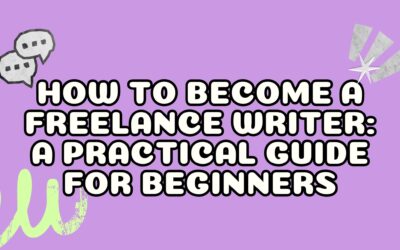So there’s a lot of talk about having a freelance writing niche at the moment, isn’t there?
In my welcome email to new subscribers (sign up here and get a freebie!), I ask what struggles they face as freelancers, and a significant amount respond saying that finding a freelance writing niche is really holding them back.
And, I want to add a caveat here. While having a niche is important in the long-run (I’ll go into more detail in a mo), not being able to choose a niche shouldn’t be something that stops you in your tracks.
It shouldn’t be a sticking point in your career because, as most freelancers will learn, niche can be a fluid thing that changes over time.
I’m working on a piece for next week that highlights how I switched niches partway through my career, which just goes to show that it doesn’t have to be set in stone (and it can even do wonders for your business – you’ll find out more next week about how my switch sky-rocketed my income).
How to Choose a Freelance Writing Niche
Choosing a niche is kind of like being in a Belgian chocolate shop and being asked to just pick one chocolate to take home with you.
You want them all, right?
Not just because you want all that chocolate-y goodness in your mouth right this moment, but because you don’t want to be limited to just one. You want to try them all.
I mean, what if the white chocolate truffle turns out to be better than the almond truffle and you never get to know? Well, that would be an absolute disaster.
Here’s the good news: you don’t have to pick just one niche.
There’s so much advice out there harking on about how you need to have just one niche; just one area that you write in.
I say no way to that. Variety is the spice of life after all, right?
Personally, I have three niches. My main niche is digital marketing content for start-ups and agencies. My second niche is business-related content for publications. My third niche is travel writing.
Yes, the first two are completely different to the third one, but I’m going to go into why that is in a moment.
Why Having One Niche Can Hold You Back
When you’re starting out, you don’t want to limit yourself to one track. Niching down is good, but you don’t want to put yourself in a box, especially when you’re still exploring what’s out there and what you enjoy.
Say, for example, you decide you want to write about makeup for fashion brands. What happens if six months down the line you realise you absolutely hate writing about makeup and you have no other samples to show clients in any other niches?
So, when you’re starting out, pick 2-3 niches so you can figure out what it is you love and where you want your career to develop.
How do you choose these niches?
1. Your past experience
Nobody goes into freelancing straight from the womb. You’ve likely had professional experiences in the work place, in internships, or in college activities in the past, so utilise these.
Consider the skills you’ve picked up from these areas and how you can leverage them in your writing career. For example, if you’ve worked as a waitress, you likely know the hospitality industry well.
2. Your hobbies and interests
The whole point of going freelance is so you can spend more time doing the things you love, right? And that means writing about things you like, too.
Think about how you spend your time away from the laptop and what you enjoy doing on the weekends. Is it hiking? Do you love going wine tasting? How about going to the cinema to watch the latest releases?
All of these show you have a keen interest and, more importantly, knowledge, in these areas which are all green lights to potential clients in those niches.
3. What the market wants
Now, it’s all well and good saying you’re going to become a movie reviewer because that’s what you love to do when the market for movie reviewers is over-saturated with college students and people doing it for free.
So what does that mean? It means the pay will be crappy and there will be high competition for jobs in that area.
In an ideal world, you can bring all of these together to come up with 2-3 niches that you feel comfortable writing in.
Like me, you might have two profitable niches and one niche that you simply write about because you love it, or you might want to stick to a series of high-paying niches.
If you want to know what kind of high-paying niches are out there, be sure to grab a copy of the free bonus below!

So now we’ve figured out what kind of areas you might want to choose for your niche, let’s look at why it’s important to have a niche or two in the first place.
How Having a Specific Freelance Writing Niche Can Double Your Income
This isn’t some sort of grand, overzealous claim – having a specific freelance writing niche really can double your income, so it’s worth honing down in the long-term.
Here’s how it can double your income:
1. You become an expert
The more you research and write about something, the more knowledge you gain on that topic. Simple.
So, say for example you write about print design. The more you write about current trends, designers, and best practices, the more clients can see that you know what you’re talking about.
And guess what? Clients will pay more to hire someone that knows what they’re talking about.
Consider for a moment that your really expensive gold watch breaks. You really love this watch so you kinda want to get it fixed in the best way possible.
You can a) take it to a jack-of-all-trades who has dabbled with watches before but doesn’t really know them well, or b) take it to a fine gold watch master who specialises in fixing exactly your kind of watch.
The first person charges less than the second person, for obvious reasons.
I bet, if you really loved this watch (and trust me, you do), you’d be willing to pay much more to get it fixed by someone who knows what they’re doing, right?
It’s the same with content.
Clients are precious about their businesses. They don’t want to be called out by their competitors, and they want to be seen as the experts in their industry. So, of course, they need to hire experts to talk about their brand – and they’re willing to pay for the pleasure.

2. You have solid samples
This goes hand in hand with point number one. The more you write about a topic, the more samples you have to show potential clients.
And guess what? A client will pay more if they like the stuff you’ve written previously.
But not only do you have relevant stuff to show them, you also have a selection of relevant stuff to show them.
Consider for a moment that a hostel brand is looking for a blogger. Someone applies who has written a travel piece about the destination the hostel is in, and someone else applies who submits two pieces written for hostel websites and another travel piece that’s aimed at the same market that the hostel wants to reach.
Who do you think will get hired? But, more importantly, who do you think the hostel will pay more? You got it.
By having a selection of samples within one niche, you’re giving yourself choices when it comes to submitting clippings. This means you can create bespoke sample selections for each application that is geared towards the target market of that client and their topic.
3. You know who to market to
One of the biggest reasons it’s so important to have a freelance writing niche is because it makes marketing your services so much easier.
If you’re willing to write anything for anyone, how do you even know where to start? You could spend all day applying for every job you come across on a job board, and you could spend a whole year emailing out proposals to businesses in your local vicinity.
It’s not viable.
When you have a niche? Well then you can start cherry-picking where you advertise your services and who you reach out to. And you know what that means? Higher quality leads.
You know where this is going.
Higher-quality leads are the ones that will see the value in your work (which is highly relevant to their niche) and will pay you more based on your knowledge and interest in that area.
Having a freelance writing niche isn’t just a ploy so you can have something worthwhile to write on the homepage of your website. It’s a way to streamline your business and earn more money – and who doesn’t want that?!
By sticking to two or three freelance writing niches, you’re showing clients that you’re an expert in those areas and that you have the samples to back up your knowledge. What’s more, you know who these clients are and where to reach them to market your services to them.
It takes time figuring out the niches you’re comfortable writing in long-term, so don’t give up on the first run. Feel free to mix and match until you find a combination that a) you’re happy with, and b) that pays well.
If you’re wondering what kind of high-paying freelance writing niches there are out there, be sure to grab a free copy of the bonus article below!







Thanks to your help, I’ve pinned down my intended niches as the heritage industry, independent artists/designers/galleries, and publishing. I’ve got loads of samples about writing and marketing as an author, so it seems daft not to use them! (Plus those marketing tactics for authors can also work for artists so it’s doubling up 😉 )
So glad you’ve pinned down your niche! And it’s awesome that you have loads of samples ready to go – I bet that’s a huge weight off your shoulders 🙂
Another amazing article, Lizzie. Really agree with so much here, especially the value of choosing a few niches and not feeling “trapped” by having a niche.
One topic I would like to see you discuss is the difference between B2B and B2C freelance writing, because I think the competition is so much fiercer in the B2C (business to customer) market. This is because the topics are often ‘sexier’, as they include things like travel, entertainment and health – relating to the experience you had of the competition you encountered.
Many of the most successful freelancers that I follow online have tended to have experience in some very specialised B2B niches, such as finance or property development.
Thank you for sharing!
Catherine` recently posted…Reflections on my self-employment so far
Thanks, Catherine!
That’s a great topic, thanks for the inspiration! This month is all about niche, so I’ll be touching on various different aspects of this. Next week, I’m going to be talking about my switch in niches, so I’ll cover a bit about the difference between B2B and B2C since I switched between the two at the start of this year.
YES, B2C is so much sexier, but that’s why they tend to pay less – because people are willing to write for free (I mean, who doesn’t want to go to a party and say, “Yeah, I’m a travel writer!”)
Fantastic article!!
I feel like in general, people get overwhelmed with niches. However you made a valid point you don’t need to pick one right away OR have just ONE. I think that’s a main issue with Freelancers. On the contrary, having a niche would def increase their clients and income 🙂
Jenn| http://www.creativeboundless.com
Thanks, Jenn! YES, I find a LOT of freelancers freeze up because they can’t choose a niche and this sets them back a few weeks or even months, sometimes. Ploughing on through and figuring it all out as you go can often be the best way to do it 🙂
My first business was freelance science writing and editing. It was “easy” to get high quality, high paying clients by positioning myself in that technical niche (as a graduate-educated, published scientist as well). I had initially just tried to get any job available, then I realized that I was really underselling myself. Great advice!
This is a great story, Mallie! We all have to start somewhere, and tapping into the skills and knowledge we already have is a great place to do that. We can always branch out from there!
You responded to my post on reddit (thank you again) and linked this article. You’re seriously so helpful! I look forward to exploring your site more.
So glad I could help, Melissa! Let me know if you have any questions 🙂